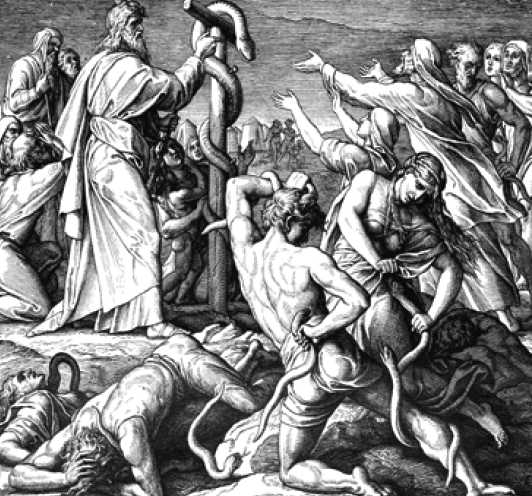….. The Complaints that Led to the Famed Scripture
I bang the drum with great regularity regarding bringing context to the scriptures. I sincerely believe that without the context around which the scriptures are comprised, we lose focus.
Without context, we inevitably end up searching passages and trains of thought in the writings which may have little or nothing to do with the problem we went to the Bible for in the first place.
Unfortunately, while English is a very descriptive language, often the original intent of a scriptural passage, due to the process of translation from Hebrew or Greek, is altered into a perceived different meaning only slightly, but sometimes dramatically.
I avoid the use of the term “mistranslation” because, as we look at the texts objectively, we have to accept that certain translation issues arise, not as a bug, but rather as a feature. That is to say, in absence of malice or will toward deception – both of which do occur when speaking of written translation of languages, especially from ancient texts-certain contextual fragments do get “lost in translation” as it were.
Let’s see if we can’t capitalize on a failure in understanding that has transcended generations of Bible readers and scholars due to what was lost in translation.
FAILURE IS AN OPTION SOMETIMES
We should try to understand that so much of the triumph God has in store for us, in no insignificant manner, is exposed through human failure. From time to time, one individual or group of individuals come to an understanding in Christ largely due to a human failure. These failures often come about in the way of
• Failure to discern, failure to speak, failure to act.
• Failure in terms of faith.
• Failure to accept truth based on that faith.
• Failure to be alive, or be healed such as in the case of Lazarus.
At the extreme end, by way of the failure of the Jews to accept Christ as the Messiah, the Gospel was extended to the Gentile peoples:
I ask, then, have they stumbled in order to fall? Absolutely not! On the contrary, by their stumbling, salvation has come to the Gentiles to make Israel jealous. Now if their stumbling brings riches for the world, and their failure riches for the Gentiles, how much more will their full number bring! (Romans 11:11-12 HCSB).
This scripture also speaks of the time when they will come to acceptance and understanding, and the book of Romans goes into great depth in terms of how Paul imparts the same ultimate message to two distinct peoples in the church at Rome (Jewish & Gentile believers).
John 3:16 is likely the most quoted and the least understood passage to appear in your Bible. Due to the most common mode of translation we have isolated this verse to the detriment of our understanding. This whimsical saying of Christ comes about in part, believe it or not, by failure.
JESUS AND NICODEMUS
There was a man from the Pharisees named Nicodemus, a ruler of the Jews. This man came to Him at night and said, “Rabbi, we know that You have come from God as a teacher, for no one could perform these signs You do unless God were with him” (John 3:1- 2).
Jesus did not thank him in regards to his recognition of Him as coming from God. Nor did He tell him to follow Him. Instead, He answered him in a way to consider the spiritual will of God, for up until now Nicodemus recognized only the physical signs. Christ, it would appear, wanted to expand his thinking beyond where it was currently, which is of real value.
Jesus replied, “I assure you: Unless someone is born again, he cannot see the kingdom of God”. But how can anyone be born when he is old?” Nicodemus asked Him. “Can he enter his mother’s womb a second time and be born?” (John 3:3-4 HCSB).
There must be a transformation at a very deep level before one can see either the Kingdom in its ultimate glorious manifestation as God’s dwelling place on Earth, or will be receptive to the Spirit which makes that Kingdom both audible and visible to the believer.
This verse has been mischaracterized as Nicodemus being ignorant of what Jesus was saying. Some have suggested that he was being willfully obstinate, however this is an assumption from a biased viewpoint to villainize his sect. He was in fact an intelligent man.
In actuality, a brief study of the traditions of Jewish conversation and writing, we will find that this is a recording of a conversation between two Jewish men – in Jewish style. It was a means of trying to get a clarified point of view from Jesus.
Jesus answered, “I assure you: Unless someone is born of water and the Spirit, he cannot enter the kingdom of God. Whatever is born of the flesh is flesh, and whatever is born of the Spirit is spirit (John 3:5- 6 HCSB).
As it pertains to this passage, hopefully we can agree that Nicodemus knew there was more to what Jesus was saying and was attempting to have Him articulate it in relevant terms.
Do not be amazed that I told you that you must be born again. The wind blows where it pleases, and you hear its sound, but you don’t know where it comes from or where it is going. So it is with everyone born of the Spirit.” “How can these things be?” asked Nicodemus. “Are you a teacher of Israel and don’t know these things??” Jesus replied (John 3:7-10 HCSB)
Jesus is now asking him how, with all the background of their upbringing, they (Nicodemus in representation of the Sanhedrin) could miss the spiritual gift of prophecies fulfilled in Him. We can perhaps appreciate Christ’s intent from the beginning with Nicodemus – to take him beyond the current experience – to recognize the spiritual presence of Christ.
I assure you: We speak what We know and We testify to what We have seen, but you do not accept Our testimony. If I have told you about things that happen on earth and you don’t believe, how will you believe if I tell you about things of heaven? No one has ascended into heaven except the One who descended from heaven – the Son of Man (John 3:14-15).
As he is lifted up, we can experience the Heavenly perspective.
The reference to the snake lifted up in the wilderness is found in Numbers 21, where the Israelites, weary from the journey, spoke against God and Moses. This is the infamous “Why did you bring us here to die?!” scene.
So God sent venomous snakes amongst them, and those who were bitten died. Of course, they appeal to Moses to ask that God remove the snakes. This would be the same appeal we would make. Even today we call on God to remove the adversarial elements in our lives.
God did not grant this request. He did not remove the snakes. Instead, He gave a detailed set of instructions to Moses:
Then the Lord said to Moses, “Make a snake image and mount it on a pole. When anyone who is bitten looks at it, he will recover.” So, Moses made a bronze snake and mounted it on a pole. Whenever someone was bitten, and he looked at the bronze snake, he recovered (Numbers 21:8-9).
Again, hopefully we can agree that there is something to the imagery of snakes being in and amongst Israel, biting them, causing death, yes of their loved ones and causing overall societal distraught.
God does not remove the “snakes”. They had to make their way to look at the elevated bronze snake. They had to look at it and be mindful of where the healing came from. It is conceivable some just made it with their last gasp and ability to look up with the help of others.
This now takes us to our scripture of interest. Most translations read in the following manner:
“For God so loved the world, that He gave His only begotten Son, that whosoever believeth in Him should not perish, but have everlasting life” (John 3:16 KJV).
The word translated as “so” or “so much” occurs over 200 times in the NT. Almost without exception it is an adverb of manner, not degree. For example, see Matthew 1:18 describing the birth of Christ as taking place “as so”. Blue Letter Bible
The Greek word is houtos and only has application as a modified adjective (meaning “so much”) in Galatians 3:3 and Revelation 16:18.
The rendering we find in translations like the Holman Christian Standard Bible (HCSB) read more like “For so, God loved the world….” “For so” meaning as stated above with reference to the story in Numbers 21.
“For God loved the world in this way: He gave His One and Only Son, so that everyone who believes in Him will not perish but have eternal life. For God did not send His Son into the world that He might condemn the world, but that the world might be saved through Him” (John 3:16-17 HCSB).
Christ is explaining that, similar to the account and experience recorded in Numbers 21, the malevolence or snakes which surround us in our lives will not be removed. Rather we are given a Savior who was sacrificed- or lifted up– to look to, to believe, to emulate (right down to our own self-sacrifice) when navigating the evil that befalls us and affects us, and how to interpret it in light of God’s will.
Christ does not even condemn the snakes necessarily, or at least not in this context; He explains how He is the cure for the snakes’ effect on us–but we have to go to Him. So, with a bare minimum of simplified examination, we can see a much different meaning behind John 3:16 when we distance ourselves from the conventionally used frame of reference which is largely due to a loss in translation.
The conventional thinking being that God just loved the world so much, that He sent His Son to die for it. However, the deepened explanation being that, as with the Israelites of Moses’ time, Christ’s sacrifice would provide healing (both physical and spiritual) to those who truly believe in the power of His death and triumph over it.
What this means in terms of the importance of scriptural context is that the Old Testament accounts are dismissed at our peril. Christ and His disciples, and later Paul and so forth, used them exclusively because that’s what they had.
The Old Testament accounts mentioned and referenced by Christ (others, but Christ in particular) contain the blueprint to the context by which Christ and the apostles taught from and serve to clarify and strengthen our understanding of New Testament concepts. Quite a provision that has been made for us. We must take the time to look toward Christ’s intent for us, and even how He gets that message across.
If we look at the Old Testament as less of a compilation of stories about Israel’s triumphs and failures, and more in terms of it being the story, His story, of how He dealt with Israel, keeping His promises at all times, and how this translates to the direction and means by which the New Testament came into being. In doing so we will have a much better handle on our journey, or at least be heading in the right direction – contextually speaking of course.






